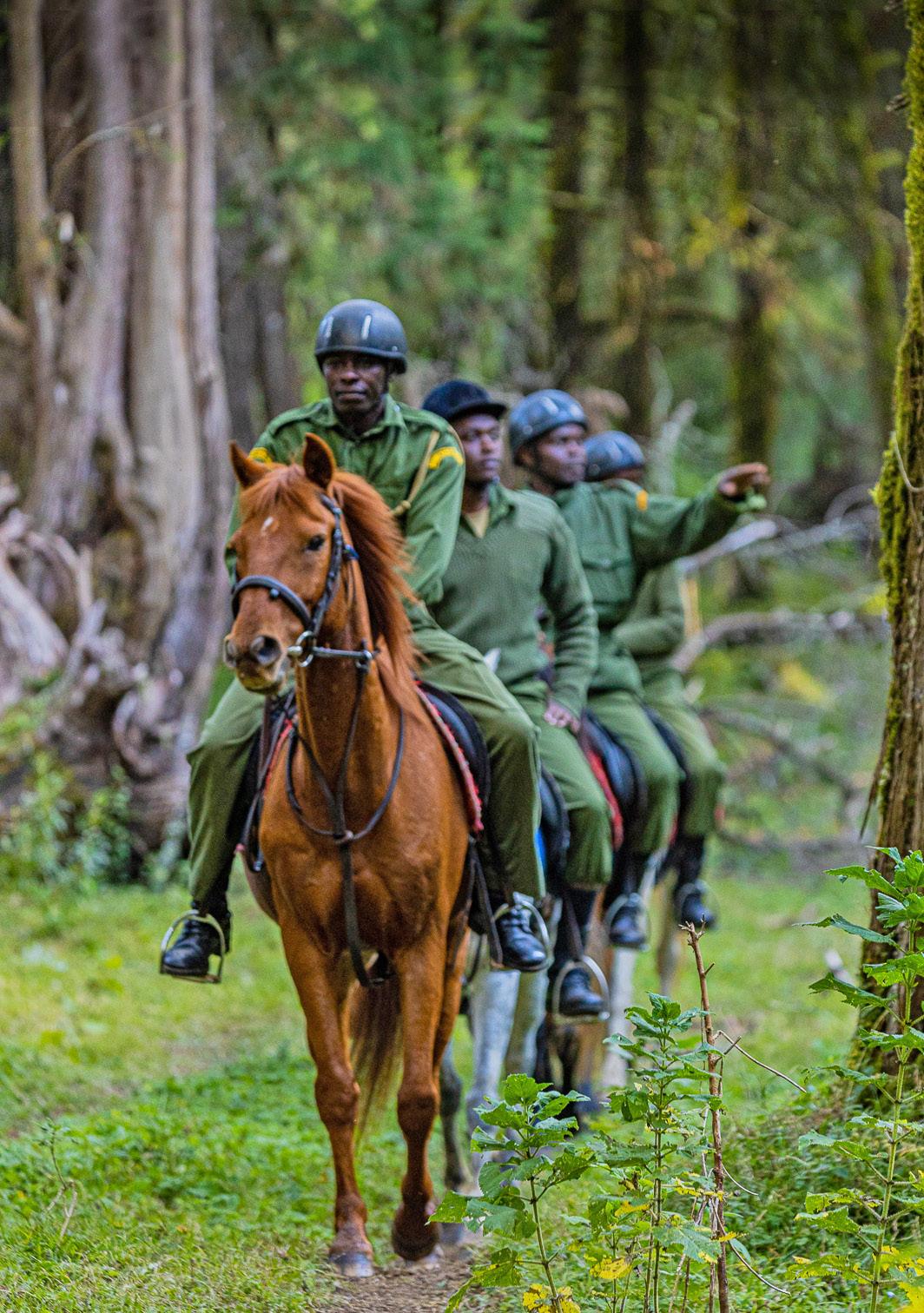
2021 ANNUAL REPORT
WHO WE ARE
The Mount Kenya Trust works to protect and conserve the forested expanse around Africa’s second highest mountain. Mount Kenya’s ecosystem services are vital to the Kenyan population and economy. We use a holistic and partnership-based approach that puts people at the center of our programmes to protect and conserve forest, water, people and wildlife.

VISION
The Integrity of the Mt Kenya ecosystem for the welfare of all who depend on it.
MISSION
To drive collaborative action for the sustainable management of Mount Kenya’s biodiversity and natural resources through partnership with government, communities and civil society.
VALUES
The organization has earned the trust of its partners through its integrity and the dedicated work of its field teams and management. Upholding these values is important to the organization and it believes its small size and clearly defined focus area will help it to maintain its critical relationships with key stakeholders.
2
Photo Credits: Routes, Mount Kenya Trust, Sarah Weiner and Anthony Ochieng/TonyWild in collaboration with the Wildlife Ranger Challenge and supported by Natural State, the Game Rangers Association of Africa and the Scheinberg Relief Fund to raise the profile of Africa’s rangers and showcase their important and diverse role in conservation.
Dear Mountain Friends,
Mount Kenya is regarded as a holy mountain by the communities living around the gleaming forests and dramatic moorland landscapes. It’s nearly impossible for anyone to drive by the slopes without staring up in awe at the sweeping vistas culminating in rugged, often snowy peaks.

From our experience working on and around the mountain for over two decades, we have seen changes in the severity and type of threats to the forests and moorlands and partnered in many successful projects with all the stakeholders. Over the past 4 years, the dynamics of climate change and population pressure have starkly begun to exert new pressures on the many habitat layers.
We can never feel separated by this mountain - it secures and feeds all of us living nearby, and many far afield. We must do everything we can to protect this landscape for generations to come.
Shorter rainy seasons, more intense forest fires, unsustainable water extraction and the movement of thousands of livestock onto the mountain on a near-permanent basis mean that we all have to face the problems with new approaches with new and strengthened partnerships. The issues are complex and will demand substantial change in an overall management approach to ecosystem protection to protect the biodiversity and ecosystem services that Mount Kenya famously hosts and provides.
This landscape is intricately linked to other wildlife conservation landscapes, agribusiness, large and small-scale farming, food security, pastoralists, energy provision and climates. In the face of global climate change, we must map out the journey to keep our mountain thriving despite and because of the increasing pressures. This strengthens our passion and effort to protect this mountain; our source of life and our natural security.
The effects of the Covid years have had serious repercussions on human lives and global economies. The knock-on impact for conservation efforts has been severe on the African continent and beyond. With the collapse of tourism and the inevitable impact on philanthropy, the mainstays of modern conservation models, NGOs have been grappling to stay afloat.
However, what has stood out for us at this time is the importance of innovation and partnerships with incredible people who have stepped up to help fill the gaps with powerful ideas and new opportunities. Ideas that make the most of our digital age and the ability to build online communities. One example of this is the Wildlife Ranger Challenge, which has helped to keep rangers all over Africa, including our own, employed to protect critical wildlife habitats that face increasing threats caused by the socio-economic crisis.

Living through Covid’s inevitable disruptions and disappointments, and our own personal ups and downs has made a close and hardworking team more of a tight-knit family than ever, dedicated to supporting conservation and providing community support to achieve it.
Without you - our supporters and partners - our resilience would have less scaffolding. You’ve come through for us time and time again and given us the power to keep achieving vital conservation goals.
With gratitude, Susie and the Mount Kenya Trust Team
Glance
RANGER LIFESAVER TRAINING (MKT RANGERS 15TH JULY, ILLMAMUSI DEC)


Our certified Ranger Life Savers, Martin Kinyua and Robert Murega, started by training MKT rangers with lifesaver skills. They are qualified trainers having completed instructor training provided by LEAD Ranger instructors in Tsavo. Following a request from the Laikipia Forum to help community rangers at Illmamusi, our rangers gave 5 days of training to the group. LEAD Ranger kindly assisted with the provision of life-saver kits for the Ilmamusi team.
WILDLIFE RANGER CHALLENGE (WRC) (30TH JULY - 18TH SEPT)
MKT rangers took part in the second Wildlife Ranger Challenge. The challenges are spread across three months and include different fitness activities including sit-ups, press-ups and a quiz, and the final challenge of running 21km carrying a 22kg backpack. Rangers from all over the African continent took part in the challenge.
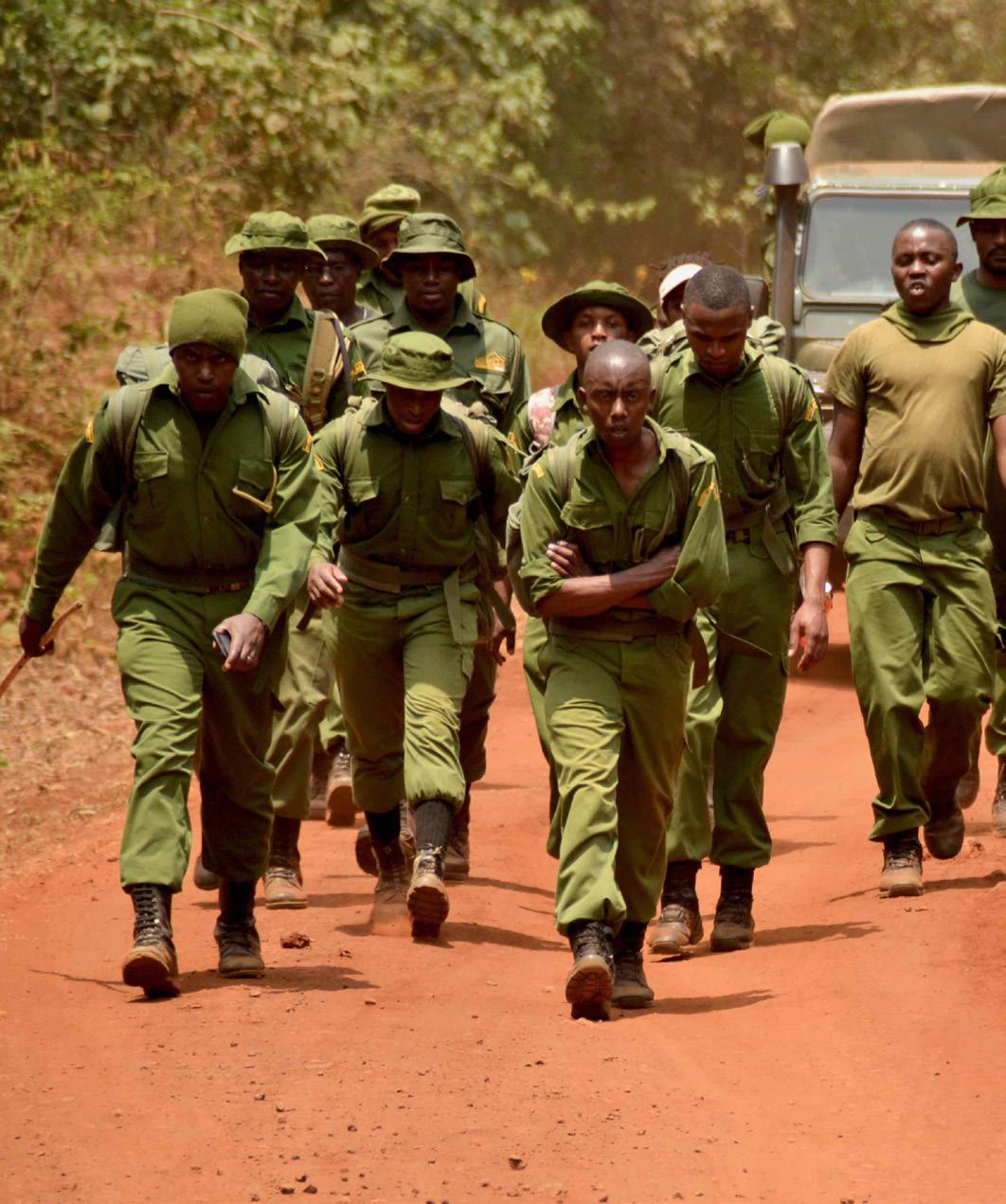
MOUNT KENYA FIRE PREVENTION COMMITTEE

MKT assisted with the formation of a new committee for the prevention of wildfires on the mountain. The stakeholders and representation are from KFS, KWS, Community Forest Associations, Rhino Ark and local administration. The committee identified nine wildfire hotspots within the Mount Kenya ecosystem and resolved to train and equip at least 20 CFA members with firefighting skills so that the first responders are more prepared whenever there are forest fires in their respective forest areas.
FIRE AWARENESS, ARREST AND RESTRAINTS SKILLS
The British Army Training Unit in Kenya (BATUK) approached MKT management for fire awareness and firefighting training for their soldiers after the MKT team successfully came to their aid to help fire fight in 2020. Five trained firefighters selected from different teams went to their base in Northern Kenya to provide a rapid theory introduction and use of tools for wildfire fighting. In return, BATUK provided MKT rangers training in unarmed arrest and restraint skills.
4
At a
EARTH RANGER USER CONFERENCE
In November 2021, our Programmes officer, Enock Ochieng, attended the EarthRanger User Conference in Johannesburg. The conference was attended by representatives from all over the globe, but with a focus in and around the African continent. During the three day course, many topics were presented on how EarthRanger has positively impacted the landscape of wildlife conservation.
COMMUNITY HEALTH WORKSHOPMARCH 2021 & MAY 2021
All the Community Health Volunteers (CHV) were brought together for a one-day workshop, plus a refresher training. The workshop’s main agenda was to brainstorm to plan a way forward for the health project. The group of 33 CHVs were split into two groups with each taken through a four-day CHV refresher course.
During the training, we were privileged to have a representative from DKT International train the CHVs on the use of long-term family planning methods.
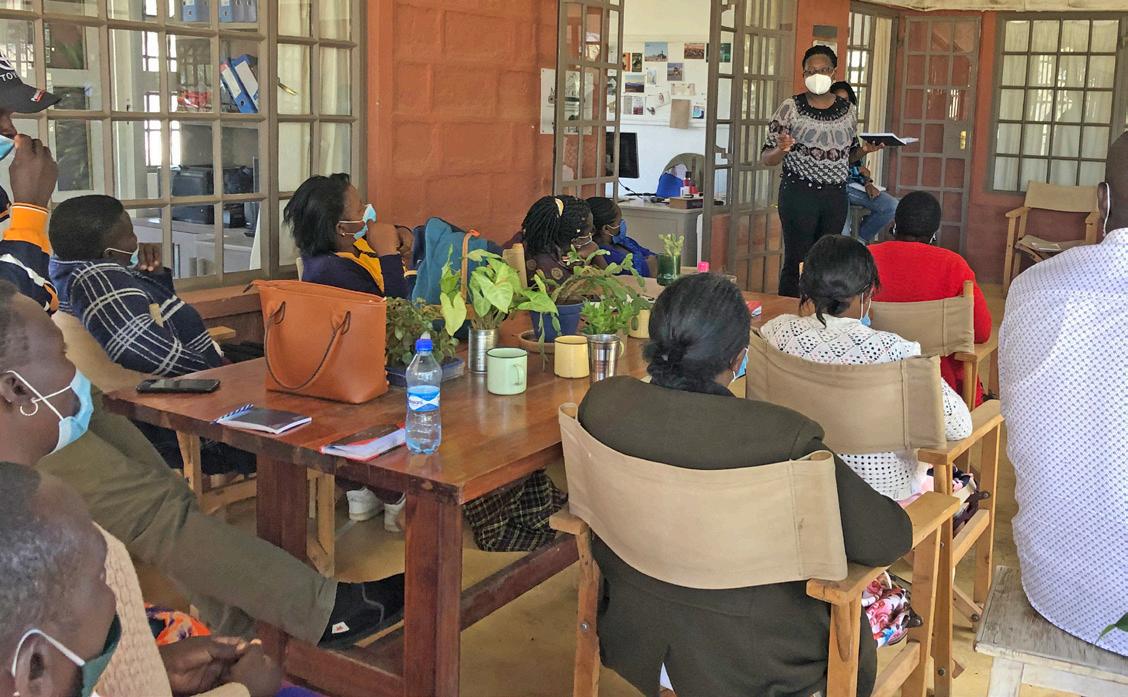
of Finance and Operations to the team. Laila comes with a background in investment funds, NGOs and Embassies in areas focusing on administration and operations.
Charlene Wandera, our Tree Planting and Education Officer, was promoted to Reporting, Monitoring and Evaluation Officer. Charlene started as an intern for the Trust in 2016 and her keen eye for detail and development of the projects and activities on the ground made her the perfect candidate for this role. We are excited to see her grow in this role and we know she will excel!
MIGRATION TO GOOGLE WORKSPACE
As MKT grows, so do its processes and functionality. Innovation and adaptation to new technology will support our growth in an efficient way. We, therefore, decided to migrate to Google Workspace which is free as we joined as an NGO.
RENOVATIONS AT KITHIIRA
At the request of the Meru County Forest Conservator Meru (KFS), we assisted with the renovation of a Ministry of Water building at Kithiira in order to help accommodate rangers from Ruthumbi Forest Station to enter the forest in the area which is notorious for high-level camphor logging. The equipment and labor for the job were supplied and paid for by the MKT and the building is now occupied by KFS rangers and used for joint and ambush patrols in the area.

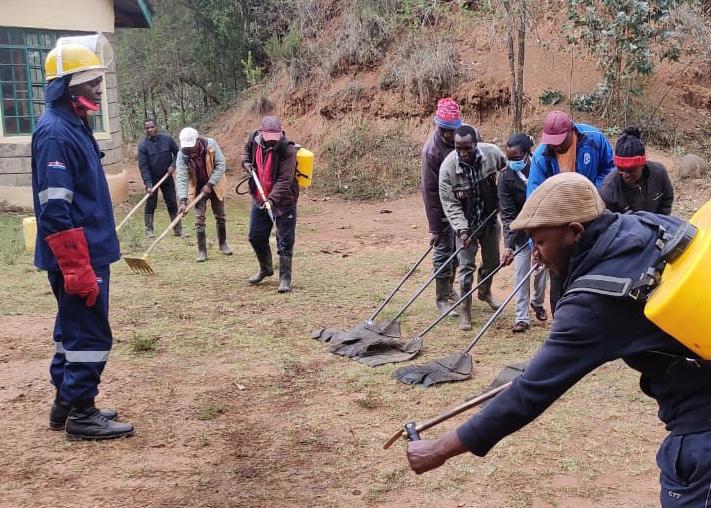
NEW TEAM MEMBER AND CHANGE OF ROLES
Edwin Kinjanjui, our Senior Ranger, moved into the office after many (many!) years out in the field for the Trust. He hung up his boots to take on the position of Education Officer. We have no doubt that Edwin will thrive in the new position and we look forward to seeing how his tenacity and love for wildlife influence the people he works with.
We also formally welcomed Laila Kassam as the Head
COMMUNITY FOREST ASSOCIATIONFIRE AWARENESS AND TRAINING
A total of nine Community Forest Associations (CFA) were chosen for fire awareness and firefighting training based on the geographical fire hotspots. Rhino Ark and MKT covered the cost of the twoday training for each CFA. In December 2021, 6 training sessions run by MKT Rangers (with formal firefighting training) had been completed at Nanyuki, Ontulili, Marania, Mucheene, Meru and Chogoria Forest Stations. The final 3 training sessions were completed in January 2022.
5
SHORT FENCE IMPROVEMENT
A
Evaluating the
of
the ones we have provided above. What it can’t tell
is how
have been
by their actions
The statistics can’t tell you how many people’s
arrests, snare and trap
that translates into food security or increased land value or ecosystem
saved
are the important REAL differences that our teams make on a daily basis. What was avoided by their presences, actions
Left unchecked, the pressures on the flora and fauna in our

have
the levels of elephant

witnessed in
to 2014 have dropped significantly, we now face new challenges with
We continue to address these by working with our partners to
adding inner
help to dramatically
In Imenti
conflict
forested
one-way
6
3km section of the inner elephant corridor short fence was improved by adding twice the number of outriggers to make sure that the space in between is small enough to stop an elephant from trying to break out. The work was done by a team composed of MKT Fencers, Lewa Wildlife Conservancy fencers and the Kisima security team WILDLIFE
effectiveness
our patrol teams using SMART cybertracker helps give us the statistics like
you
many mammal and bird lives
saved
including
removal and their mere presence for habitat preservation.
farms were
from crop raiding elephants and how
service protection. Those
and persistence.
wild places would
devastating consequences. Although
poaching we
2009
livestock grazing and increased human-elephant conflict.
mitigate
with fences and increasing the
areas. Our
elephant gates
reduce conflict and we continue to strengthen our elephant corridor security by
fences.
we are managing tree planting with elephant movement, a tricky problem which requires temporary corridors to be built as different restoration areas mature and new areas are prepared. WILDLIFE PATROL STATUS 36 number of rangers employed 921 foot patrols 527 vehicle patrols 77 horse patrols 29,091 kms distance travelled 5,293 hours on patrol 7,265 domestic animals sighted (cows, sheep, donkeys, goats) 748 snares found & destroyed 813 logging observations 1,913Ha area burnt
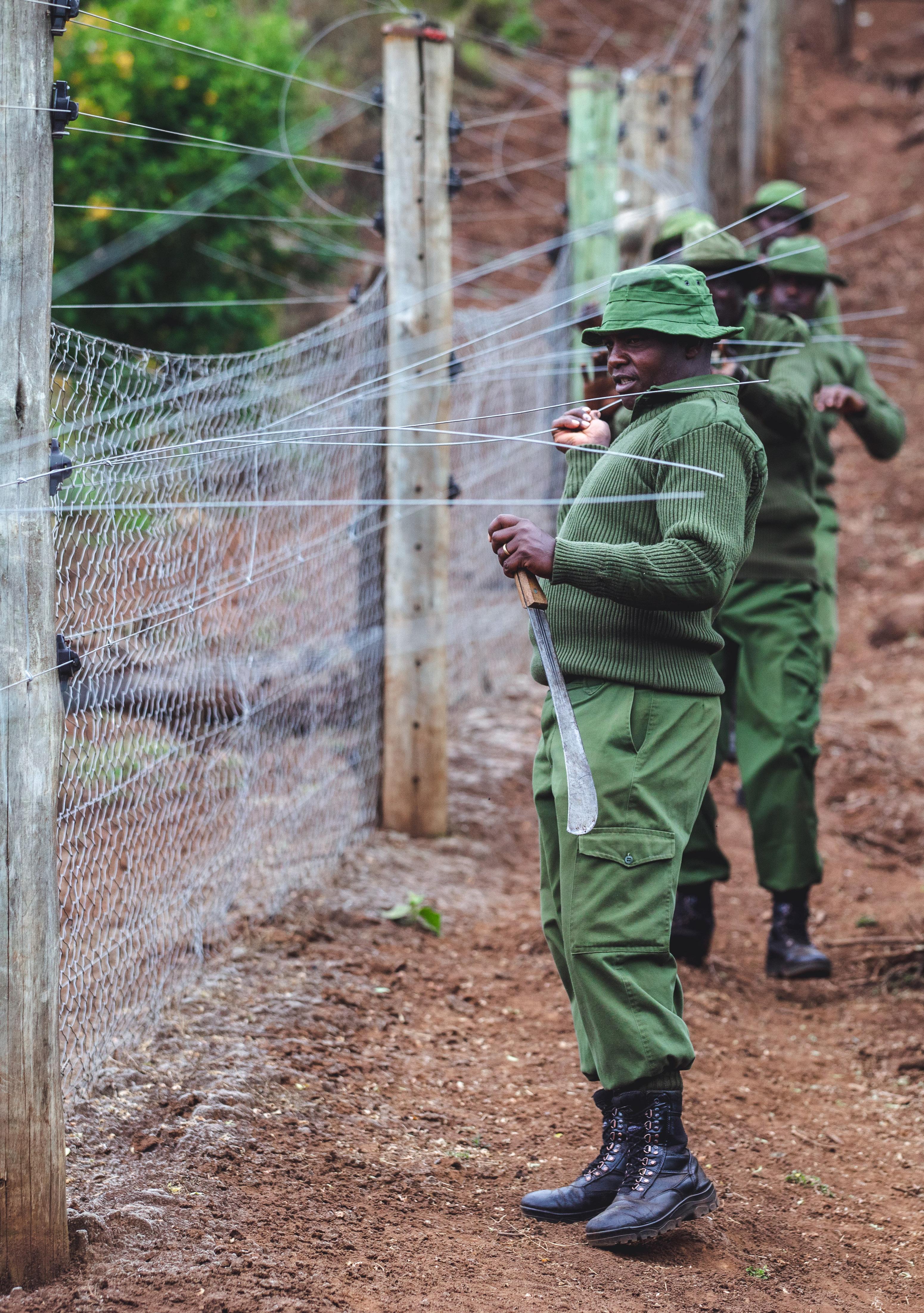
‘
7
A 3km section of the inner elephant corridor short fence was improved by adding twice the number of outriggers ’
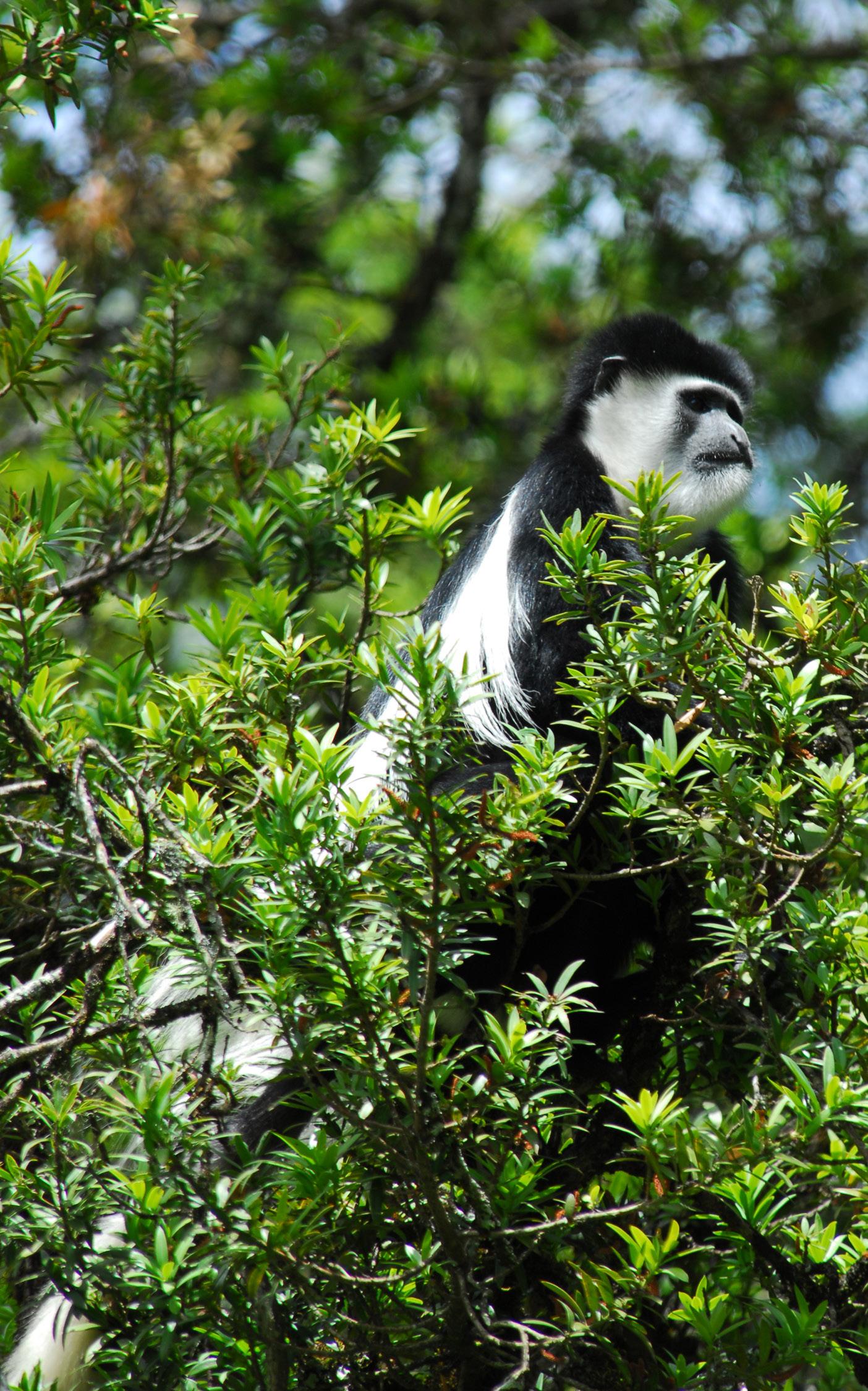
FOREST 8
Forest Restoration River Banks
Karuri, Ontulili Forest Station Marania Forest Station Lower Imenti Forest Station Upper Imenti Forest Station Lusoi Hill

Timau River Ontulili River
Ngusishi River Teleswani River
2021 began on a high note for the tree planting projects. In partnership with KFS, we reintroduced the Trees Establishment and Livelihood Improvement Scheme (TELIS) initiative. TELIS is a tree planting method that was implemented by MKT up to the year 2017 when there was a moratorium that restricted the community from cultivating within the mountain area. The ban led to high-cost implications for any tree planting initiatives. TELIS aims to be an agroforestry system, to engage the community by allowing them to cultivate while supporting the maintenance of the trees, weeding and replanting during the early stages of forest establishment (4-5 years) in areas that have been earmarked for reforestation. This is truly a win-win as local livelihoods are boosted and forests recovered.
SCHOOL WOODLOTS
With funding from Stiftung Drittes Millennium (SDM), we planted 13,513 trees in 25 schools as part of the school woodlots programme. Most of the targeted schools are near the Mt Kenya Forest Reserve boundary, and the forest is their source of firewood, whether for domestic use in their homes or the school feeding programmes.
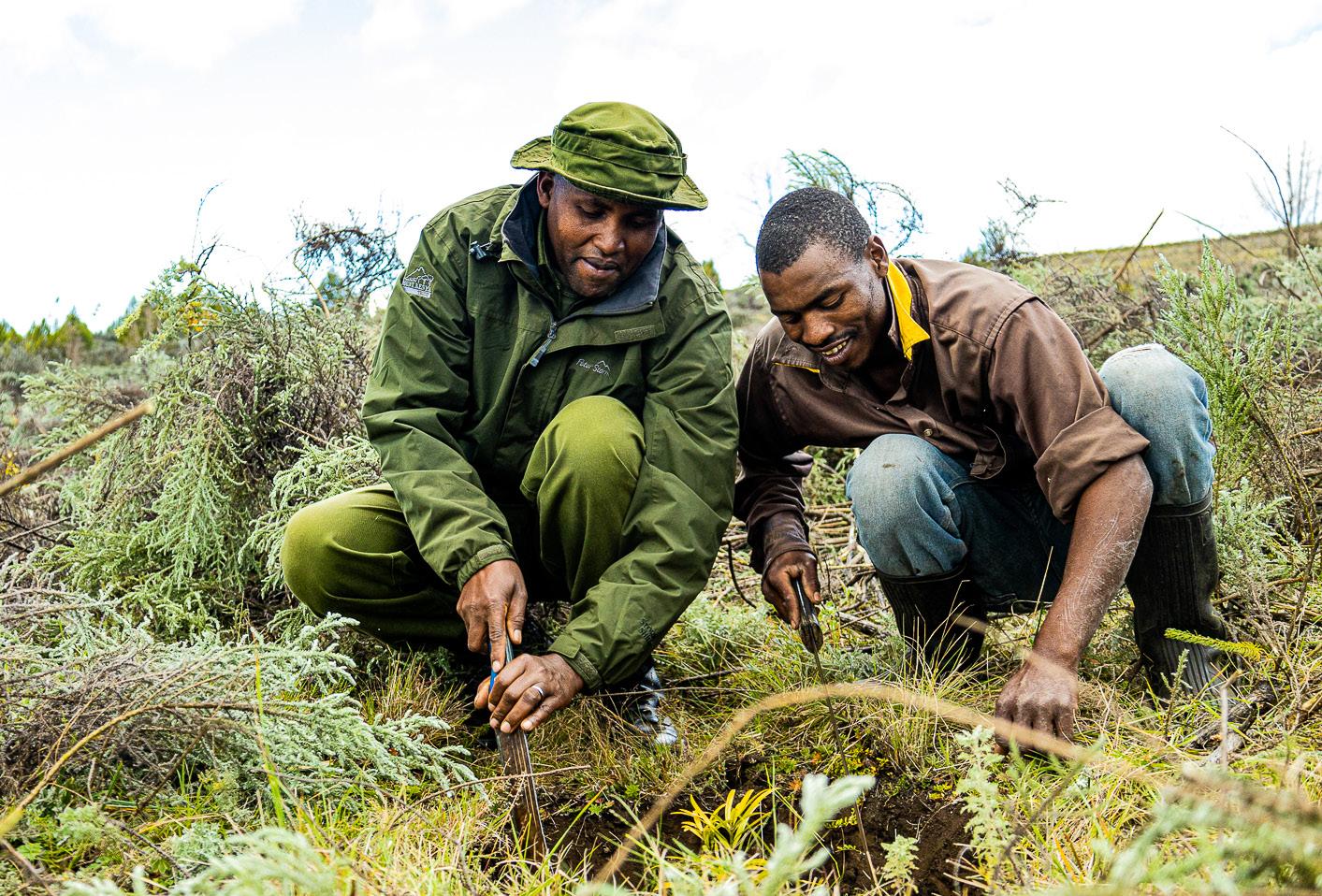
After a couple of years, the woodlots will be a new source of fuel for the school’s kitchen and feeding programmes. The woodlot will offer financial savings and reduce the pressure on external provisions of firewood from the protected forest. The goal of the project is to reduce dependency on the forest for firewood by the schools and communities around the Mt. Kenya Forest Reserve. Some schools planted the trees for either wind-breaking purposes, riparian conservation or aesthetics.
RIVER BANKS
The precious riparian land along the Ontulili, Sirimon, Timau, Teleswani and Ngusishi Rivers is severely degraded due to overgrazing and poor farming practices. In addition, along the Ontulili River, a significant number of trees were cut down, destroying the native Colobus monkeys’ habitat to reduce human-wildlife conflict.
In conjunction with the respective Water Resources Users Association (WRUAs), we planted 20,200 trees along the riparian land of four rivers this year.
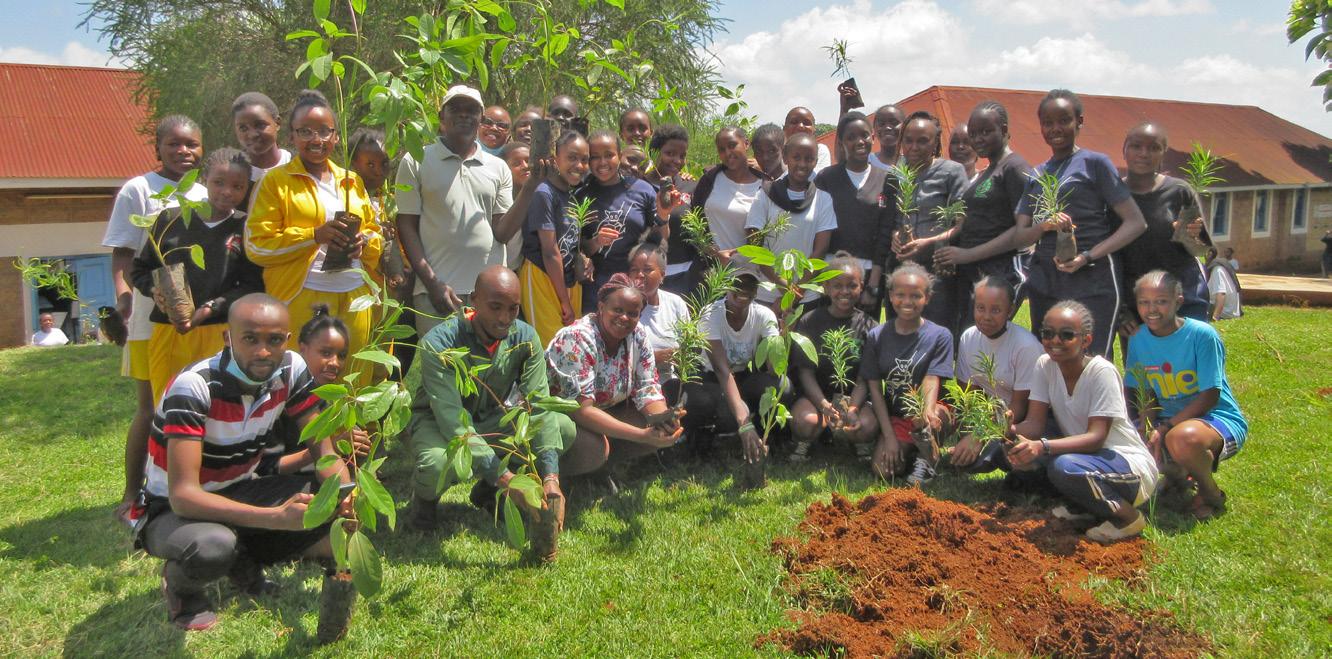
FOREST 9
5,000 5,200 2,000 8,000
40,350 34,755 26,900 70,431 5,000 a total of 177,436 trees
were planted
we planted 20,200 trees
along
the riparian land of four rivers
WATER
WATER HARVESTING IN SCHOOLS


Working with local under-resourced schools, MKT installed 8000-litre water tanks and gutters in eight schools in Laikipia, Meru and Tharakanithi. By capturing clean rainwater, there is reduced pressure on the rivers and water tower sources, protecting the mountain and rivers. It also helps the schools reduce costs and teaches students and teachers how to harvest rainwater. This will in turn become a habit and lessons they can take home. These are schools that were greatly affected during the dry seasons as they did not have any water storage and the unreliable sources of water.
Karai Primary School is located in Laikipia Central sub-county, Laikipia County in an area called Tharua which is very dry and does not have a river nearby. The main source of water for the school is piped water which is part of the Community Water Project.

With the newly installed water harvesting tank, the water is now readily available for drinking, washing hands and watering the school compound to curb infestation of jiggers. We are planning to start a tree nursery to rear seedlings so that we can improve the environment of the school. Formerly, we did not have a storage tank or any means of harvesting rainwater. But now, we are happy that, through the intervention of Mt Kenya Trust, the school is enjoying drinking rainwater. We are also going to save money that we would have spent on paying for the water charges. In a term, we would pay Ksh. 33,000. We are grateful for the donation of a water tank and hope that this is going to contribute to the improvement of our education standard since water is life.
Charles Mwangi, Headteacher.
10 ’
RIPARIAN RIVER PATROLS
MKT’s Rangers conducted patrols along four rivers including Timau, Teleswani, Sirimon and Ontulili. Each patrol included WRUA scouts. Activities the teams were involved in during these patrols were:
• Collection of litter along the rivers
• Educating the community on the importance of riparian laws
• Destroying any snares found on these patrols
• Recording any illegal activities found along the rivers in our SMART patrol database.
REGENERATIVE AGRICULTURE PLOT
The Mugumo Regenerative Agriculture Project (MRAP) is a 2.5-acre old quarry site that borders the Timau River. It suffers from elephant incursions, as well as other wildlife issues from Lolldaiga Ranch. The idea of the plot stemmed from a Baseline Riparian Survey conducted in 2020 that highlighted the significant number of abstraction points being used along the river for smallholder commercial horticulture.

In April 2021, the plot was established to demonstrate:
~ a reduction of water abstracted from the river for irrigation; reduced use of mineral fertilizers; an increased range of crops and the numbers of crops grown;
~ the introduction of other crops that will give a continuous supply of income;
~ and decrease the risks posed by growing large volumes of mono-culture.
This is being undertaken using the most common commercial cash crops grown (cabbages and tomatoes).
In 2021, MKT held two open days with over 100 people attending. We were able to talk to farmers about conservation farming techniques and inform them about crops that provide beneficial biomass for soil coverage. Farmer groups are organising independent visits to the plot themselves, which is a great sign.
ENVIRONMENTAL EDUCATION OUTREACHES
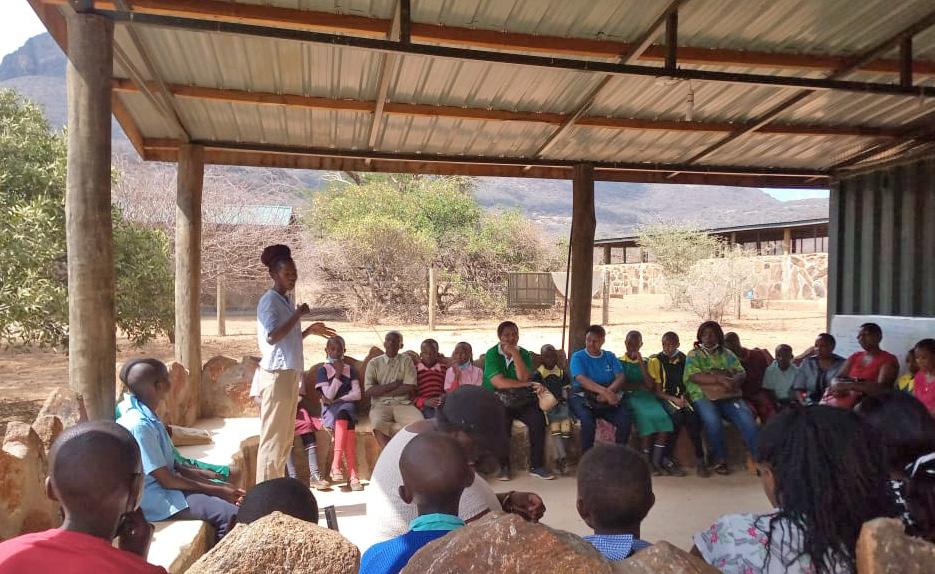
Three community environmental education outreaches were held in Meru County at Murungurune Centre, Sirimon Centre and along the Ontulili River. These areas are known hotspot areas for charcoal burning, logging and bushmeat poaching. The aim of the outreaches was to address these issues by highlighting the impact and discussing practical solutions. Kireeru Primary School and St. Mary’s Girls High School were also engaged.
ESSAY COMPETITION
Thanks to funding provided to Rhino Ark via the African Elephant fund, Rhino ark initiated an essay writing competition launched in August 2021 with KWS, MKT and the Wildlife Clubs of Kenya. Around 25 schools took part, most of which are adjacent to Imenti Forest Reserve, where human-wildlife conflict and forest fence interference by people is extremely high. The theme chosen was Our Forest, Our Responsibility and the essay title was ‘The Elephant’. Several meetings were held in preparation for the competition. The joint teams managed to visit all the schools prior to and after the essays were written, marked, analysed and ranked. The best students were rewarded with a trip to Reteti Elephant Sanctuary to learn more about elephants.


COMMUNITY HEALTH PROJECT
The project continues to deliver healthcare services, along with environmental education, to remote communities living on the forest edge. Below are some statistics from 2021:
Number of Community Health Volunteers employed – 33
Services offered to 32,916 people in Kirinyaga, Embu, Tharaka Nithi and Meru Counties:
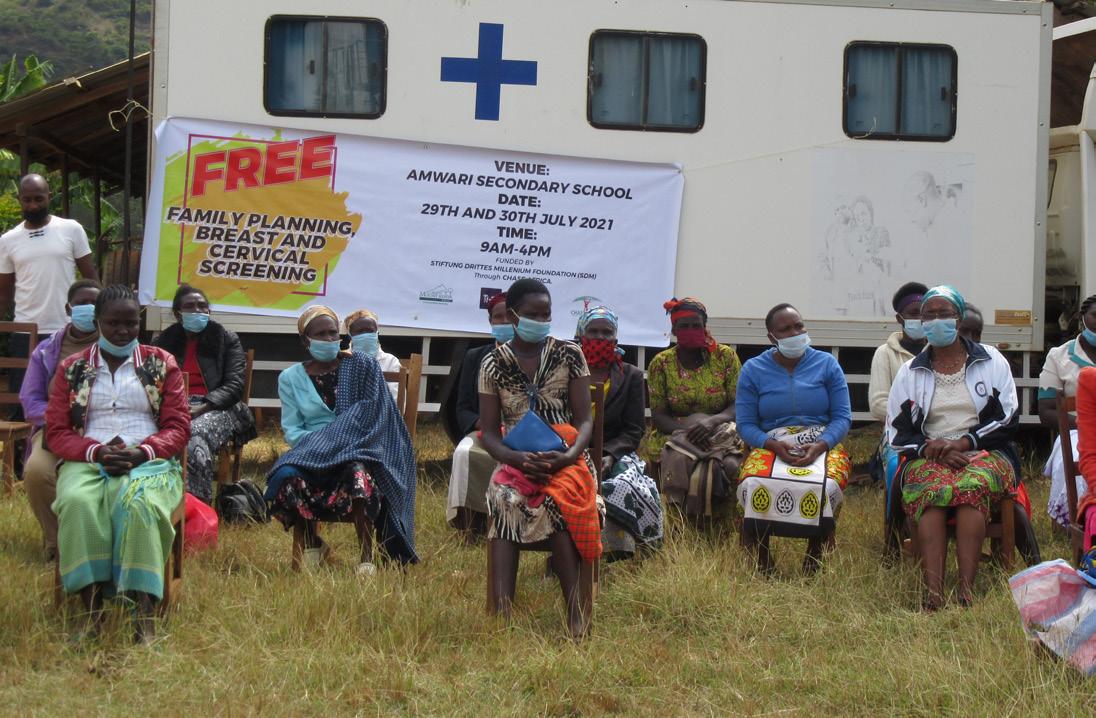
• Family planning – 30,574
• HIV testing and counseling – 42
• Cancer screening – 963
• Curative services – 1,337
Family planning services offered:
• IUCD – 826
• Jadelle (5-year implant) – 1,698
• Implanon (3-year implant) – 2,181
• Depo-provera (3-month injection) – 3,040
• Oral contraceptives – 22,829
12
Community
KETTY GITONGA
Ketty is a mum of one beautiful boy and our Community Health Service Project Manager. This year, 2021, presented many challenges for health workers across the world, which was made worse by resource shortages.
“It has always been a huge joy for me seeing women in areas with limited resources receive health information including family planning options that help them make informed choices they may not even know about. Next year we are expanding our community programme to youths. I am very excited about reaching teenagers, as the pandemic has really taken its toll on young lives.’
The project provides basic healthcare services (via outreaches and door to door services run by our trained Community Health Volunteers) in rural communities near the Forest boundary, in collaboration with the Ministry of Health.
‘What I love most about working with the Trust is being able to interact with the school children and community members. This helps me to understand more perspectives and approaches to conservation issues and its challenges. In 2021 our greatest challenge was the inability to implement our newly designed Junior Rangers Program for a second year because of the pandemic. However, we managed to contribute to many other projects, as long as the groups were small and distanced, and we spent time on riparian patrols with the rangers so that we could speak to people about sustainable water management and land use.’
They set up woodlots, water harvesting systems and energy saving stoves and gave awesome film showings!
ROBERT MUREGA Robert heads up the elephant corridor maintenance team, a team of 6 people who patrol the corridor recording illegal activity and maintaining over 28 kilometers of total fence. He is also a qualified Life Saver and wildland firefighter.
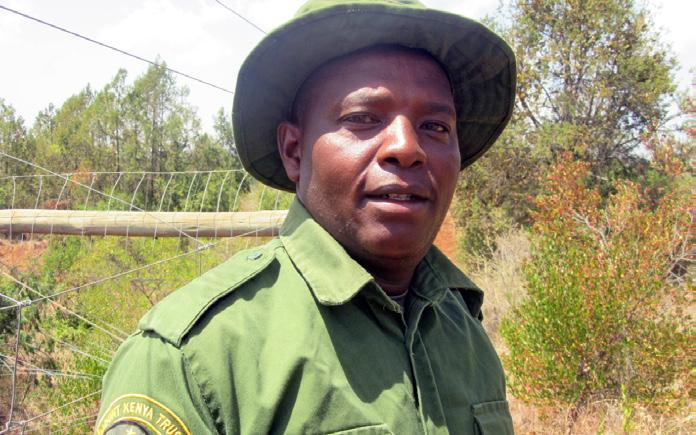

“In longer than typical dry spells like we experienced in 2021, this is when elephants are more likely to break out of the fences and raid crops in the neighbouring farms or break out to find water. For the corridor to keep working and protecting both people and elephants, it must be maintained on a daily basis and fixed immediately if it has been compromised.”
PAXTON MAINA Paxton is part of our powerful environmental education team. They talk to men, women, childrenanyone who stands still enough to listen - about conservation issues and sustainability. This could be schools, women’s groups or forest members.

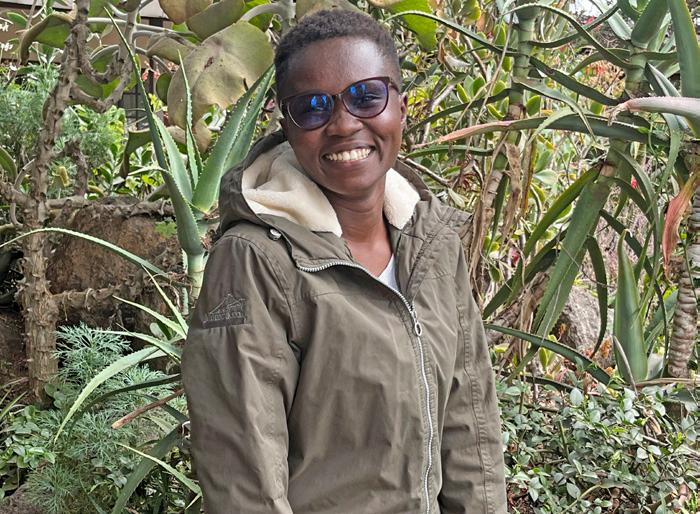

‘JIMMY’ DARLINGTON MUGICHA
Jimmy oversees the ‘north’ and you will always meet his cheery face and dirty Land Rover around the top of the mountain roads. He supports all of our teams, leads many of our mobile camping patrols and is a key player for security operations and firefighting efforts.
‘As the driver of the only vehicle supporting the three teams in the area, this means very late nights and very early starts. We can’t just rest when things get more challenging, we respond by increasing our efforts. We have had another tough year because of Covid and extremely dry conditions. I helped keep the teams motivated and pushing forward because there has been increased poaching and illegal logging. Helping to protect the ecosystem is my calling.’
JAPHET KINOTI
Japhet keeps an eye on the trees at Karuri, Ontulili. Not only supervising the planting, he closely monitors the survival of the seedlings and the farmers that grow the crops alongside the seedlings. A critical link between the KFS, the community and our management teams, he is out in the field each day reporting on successes and any illegal activity
“I love when I see previously degraded land regenerate, river levels rise and wildlife like bushbuck coming back to the areas. If you look at the area that we planted in 2012 you can see the canopy now closing.
As the work in this area has been going on for more than a decade, there are several areas where you can see the progress of regeneration over time. It’s very humbling and very important work to be able to help maintain Mount Kenya as one of the most important water towers.’
People
13
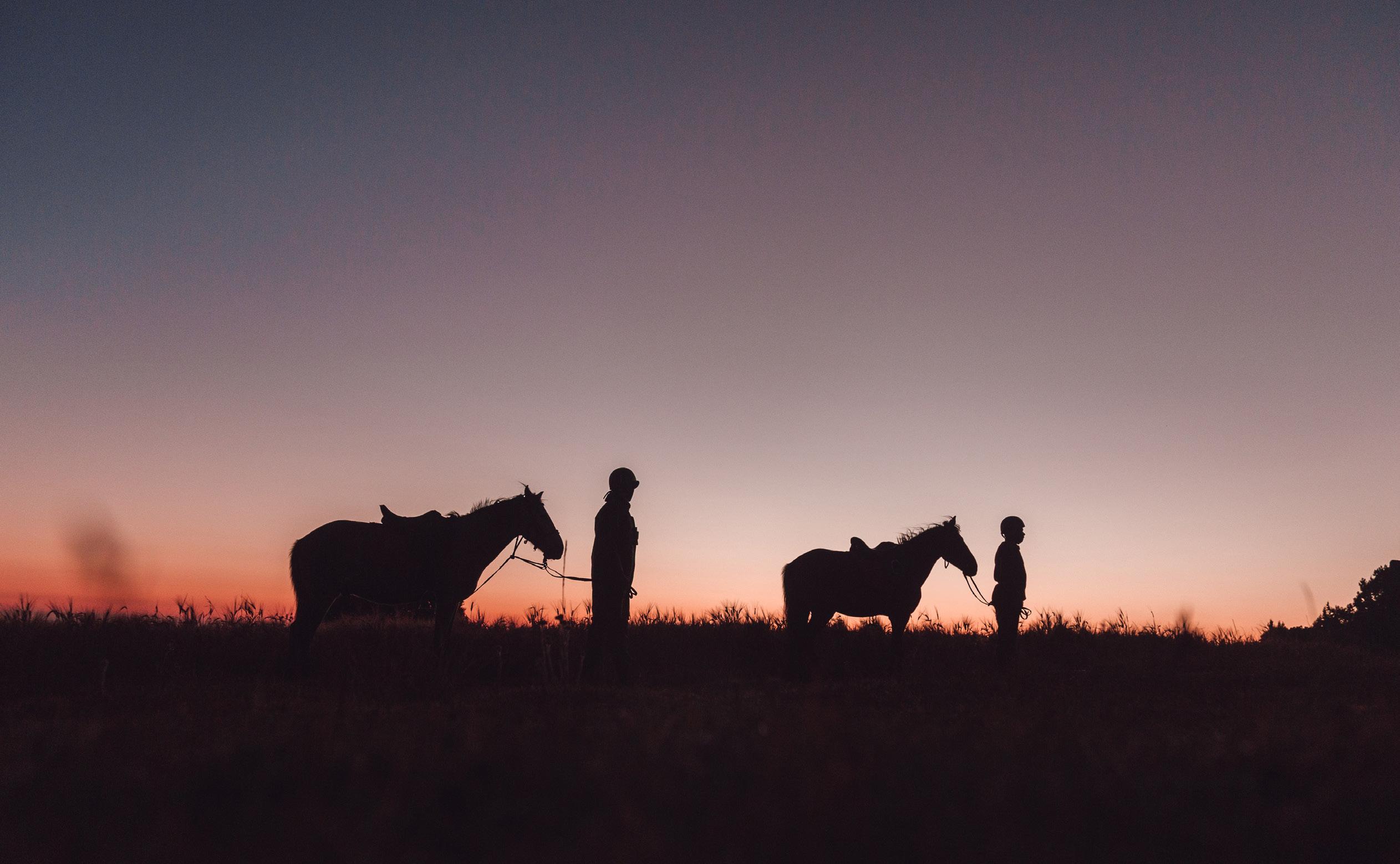
14 85,018,312 KSH (100% donations) INCOME Project Costs 63,512,229 Depreciation 3,674,312 Finance costs 421,976 Salaries & wages 15,681,078 Other expenses 1,728,717 85,018,312 Breakdown KSh Statement of Operations Project Costs Other expenses Depreciation Finance costs Salaries & wages Statement of Financial Position December 31st, 2021 KSh Capital Employed Share capital 160 Retained surplus 17,398,141 17,398,301 Represented by: Non-current assets 16,472,466 Current assets 17,178,543 Current liabilities 16,252,708 Net Current Assets/(Liabilities 925,835 17,398,301

15 13 CHASE Africa Wildlife Conservation Society Minara Foundation Eden Wildlife Trust Lewa Wildlife Conservancy Tusk Trust Limited International Tree Foundation Wildlife Ranger Challenge Timaflor Limited Sukuma Twende Trust Anonymous IUCN Save Our Species Elephant Corporation Sheldrick Wildlife Trust TITLE SPONSOR Tropic Air Mountain Bike Challenge Gold Dormans Coffee MINI 10to4 SPONSOR Braeburn International Schools SILVER Bayer HM Clause NCBA Agventure WATERSTOP Arijuju Laragai House Marania Farm Ol Donyo Farm Sieku Glamping Sirai Raka Cheese & Whey2Go Tambuzi Lewa Wildlife Conservancy The BinBan Thirteen Kings Borana Lodge Tree Nation International Elephant Foundation Frigoken LLC Sirai Managament For Rangers Allpack Industries Sirai Managament Greystones Development Co. Ethos Tour and Travel Climate Partner Mt. Kenya Alstroem Ltd Friends Of Envt Cons Trust FOECT Toyota Kenya FRIENDS OF MOUNT KENYA TRUST Born Free Foundation Browns Food Company Ofgen Equinox PARTNERS Borana Conservancy Everything Altitude Kenya Wildlife Services Ngare Ndare Forest Kenya Forest Service Timau Sports Cub Waitabit Farm Riding Wild Bike Shop Sunpower (Sangyug) BATUK Express Automation Gundua Acquamist Cottage Hospital Kisima Farm Marania Farm Ol Donyo Farm Lewa Wildlife Conservancy Rusty Nail Catering 10to4 SPECIAL THANKS Charlie Dyer Michael Dyer Martin Dyer Edward Cunnigham Jemma Batten Becky Robertson Olly Keeble Tom Lawrence Paul Benson Anne Tissier Joan Dickie Delulu Upson Big Steve JASPER HORWOOD MEMORIAL PRIZE Seya Chandaria – winner Thalia Davies – runner up ORGANIZATIONS Aliza Don and Tracey White Keith Pearson Stephen Strong Sue Horsfall TROPIC AIR 10to4 MOUNTAIN BIKE CHALLENGE INDIVIDUALS List of Donors



info@mountkenyatrust.org www.mountkenyatrust.org / www.10to4.org Events 10to4 MOUNTAIN BIKE CHALLENGE The 10to4 Mountain Bike Challenge is a series of races designed for all ages, fitness and abilities that takes place in February every year. We have had many participants from all over Kenya and the world including East Africa, UK, Europe, Canada, USA, South Africa who take part to raise tens of thousands of dollars. Go to www.10to4.org for more details. Entries for next year will open in October 2022h. Tropic Air has been the Title Sponsor for several years, followed by other local supporters who have been by our side continuously year after year. Ways to Help We are 100 percent donor funded and rely purely on individual, partners and organizations from Kenya and around the world. Every donation we receive goes to the future and sustainability of Mount Kenya. There are several ways that you can help; 1. Donate to one of our projects. $50 pays for data bundles for our patrol teams for one month $150 plants 150 trees on Mount Kenya $200 pays for a digital camera for our patrol teams $300 pays the salary and rations of our community rangers for a month $400 pays for the fuel for one of our patrol vehicles for a month $500 pays for veterinary costs for our horse patrol team for one year $1,000 pays for a motorbike for our teams $5,000 pays for a whole ranger team to operate for 2 months 2. Visit our Mount Kenya Trust tree nursery at Turaco Farm, Nanyuki. 3. Sign up for the 10to4 Mountain Bike Challenge (February 2023) 4. Join our mailing list 5. Send contributions to emergency firefighting via M-Pesa Paybill Number: 329142 >account number: “description/purpose of donation” 6. Like us on Facebook, Twitter and Instagram 7. Volunteer your time or expertise by emailing info@mountkenyatrust.org MKT offers a range of options to support our mountain conservation work. To learn more, visit our website at www.mountkenyatrust.org E: info@mountkenyatrust.org T: +254 718 235 936 MKT is registered under the UK Charity Commission number 1175321. Contributions may qualify for Gift Aid. Please go to Our Website to support MKT in the UK or contact our UK representative by emailing uk@mountkenyatrust.org




































